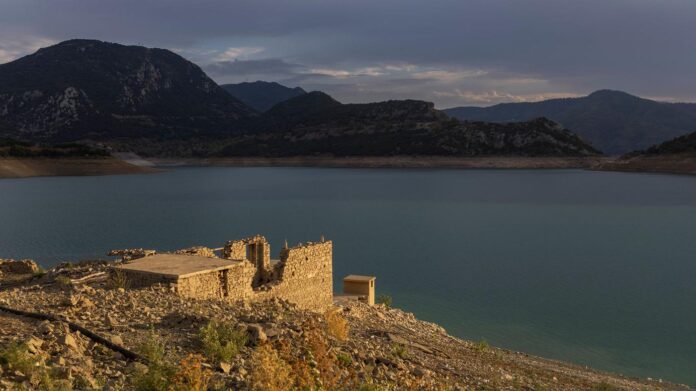
This year, Greece is drier than it has been for over 30 years. The drought is also threatening the capital Athens – the Mornos reservoir, which is located around 250 kilometers to the west and has supplied the metropolis with water for 50 years, has shrunk by a good quarter in the past two years, according to the state weather authority in Athens. Now the drought is creating impressive images of a village that once sank in the floods of the artificial lake.
Flooding over 50 years ago
Only a few dozen people lived in Kallio when the village was systematically flooded at the end of the 1970s to prevent the dammed waters of the Mornos River from escaping. “I grew up there, and there were still around 80 houses at the time,” said former resident Apostolos Gerodimos in an interview with the Open broadcaster. It was not particularly tragic to leave the village – some neighbors went to Athens, others to nearby villages.
Now the ruins and foundations are coming to light again – the school, the church. This is not the first time that the former inhabitants have marveled at the remains. During an extreme water shortage in 1993, people were able to wander among the ruins.
Onlookers marvel at the ruins
Even now, the otherwise almost deserted area is attracting onlookers. But the issue is serious, says Kimon Chatzibiros, professor of ecology and environmental policy at the Technical University of Athens. If the coming winter is as rainy and, above all, snow-poor as the last one, water-saving measures will have to be taken in Athens next year, he warned journalists. As a first step, this includes a ban on washing cars with a garden hose, but also the obligation to repair leaky pipes.
Lake has shrunk by more than a quarter
Based on satellite data, meteorologists at the Greek Meteorological Office have calculated that the area of the Mornos reservoir has shrunk from a good 17 square kilometers to around 12 square kilometers over the past two years. The greatest decline has occurred in the past twelve months. It is one of many negative weather records in Greece this year – people suffered from unusually high temperatures all summer long, and in many places it did not rain at all for months.
© dpa-infocom, dpa:240905-930-223469/1
This is a message directly from the dpa news channel.
